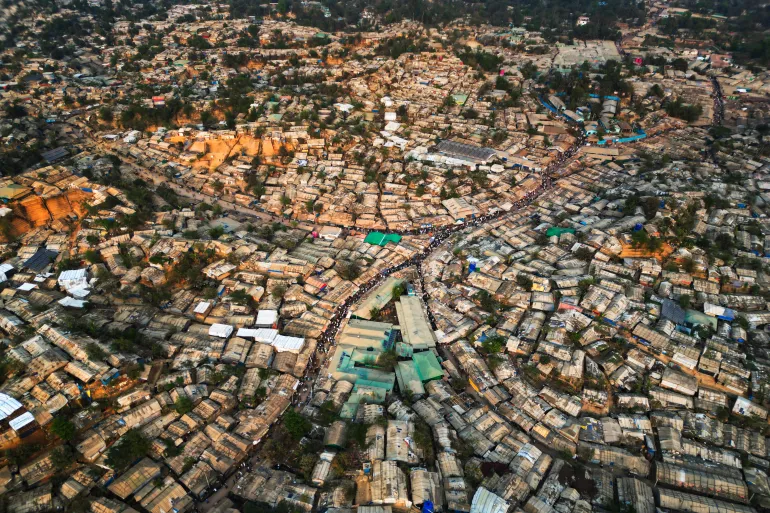Rohingya Ask UN ‘Where Is the Justice’ Amid Myanmar Violence and Aid Cuts

New York, October 2025 — Members of the Rohingya community have appealed to the United Nations and world leaders to renew attention to their ongoing suffering, as conflict in Myanmar’s Rakhine State continues to intensify and humanitarian assistance dwindles.
At a United Nations General Assembly (UNGA) conference in New York on Tuesday, speakers from the Rohingya diaspora urged international action to end violence, ensure accountability, and restore aid flows to displaced populations.
Maung Sawyeddollah, founder of the Rohingya Student Network, delivered an emotional address broadcast live to Rohingya communities across the world.
“Dear brothers and sisters, you are not forgotten. You might feel the world doesn’t see your suffering — Rohingya see you,” he said.
Holding up a photograph of victims allegedly killed in a drone attack in August 2024, Sawyeddollah asked:
“It has been more than eight years since the genocide was exposed. Where is justice for the Rohingya? Where?”
He accused Myanmar’s armed groups, including the Arakan Army, of continuing targeted violence against civilians, saying that “these are not isolated cases, but part of a systematic campaign.”
Call for Global Accountability and Sanctions
Wai Wai Nu, executive director of the Women’s Peace Network–Myanmar, described the event as a “historic moment” to refocus global attention on the crisis. She emphasized the urgent need to restore humanitarian aid to Rakhine State, where many Rohingya remain trapped with limited access to food and medicine.
She called for a “global arms embargo” and targeted sanctions on all perpetrators — “including the military and other armed groups such as the Arakan Army.”
“We need to save the Rohingya inside Rakhine State,” Wai Wai Nu told Al Jazeera.
“Many member states spoke of justice and accountability, but leadership and coordination are still missing — even within ASEAN.”
Bangladesh Calls for Repatriation and Burden Sharing
Speaking on behalf of UN Secretary-General António Guterres, Earle Courtenay Rattray, the UN Chef de Cabinet, warned that “massive aid cuts” have worsened conditions for over one million Rohingya refugees living in Bangladesh’s Cox’s Bazar district.
In response, Bangladesh’s Chief Adviser Muhammad Yunus said his country continues to bear the humanitarian burden eight years after the crisis began.
“Bangladesh is a victim of this crisis,” he said. “We have shown hospitality, but the cost — financial, social, and environmental — is enormous.”
He reiterated that Bangladesh cannot offer formal employment to refugees due to its own economic challenges, and urged the UN to focus on safe and voluntary repatriation.
“The Rohingya have always wanted to return home,” Yunus said. “Those who recently fled must be allowed to repatriate immediately.”
Global Pledges and International Justice
During the meeting, the United States pledged over $60 million in new assistance for Rohingya refugees in Bangladesh, while the United Kingdom announced $36 million. However, U.S. Special Envoy Charles Harder cautioned that such aid “cannot continue indefinitely” and called on regional partners to develop sustainable solutions.
The Gambia’s Justice Minister Dawda Jallow confirmed that his government’s case against Myanmar for genocide at the International Court of Justice (ICJ) is progressing, with oral hearings scheduled for January 2026.
“We will present why Myanmar is responsible for the Rohingya genocide and must make reparations,” Jallow said.
A Crisis Eight Years On
Since the Myanmar military’s 2017 crackdown, more than 1.2 million Rohingya have fled to Bangladesh. Another 150,000 have crossed the border in the past 18 months amid renewed violence.
The UN has warned that humanitarian funding for Rohingya relief is now at its lowest level since the crisis began. Despite repeated international pledges, justice, accountability, and safe repatriation remain elusive for one of the world’s most persecuted minorities.
